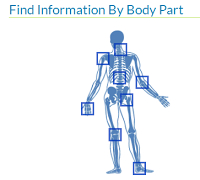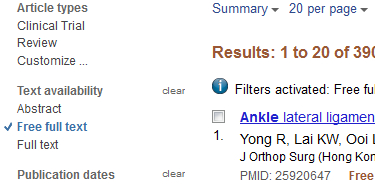
If you search Google for the term "ankle sprain" you will get one billion hits, including anything from Wikipedia to what high profile athlete just hit the DL. How do you sort for credible data through all the bad? The internet is a great tool full of valuable information, however when it comes to looking for good orthopedic information it can be a little daunting. Let's look at some of my favorite ways to get good solid information on a variety of topics. I will also show you a brief overview of how to look for published articles on PubMed.
My two favorite sites to visit for general information are administered by the Mayo Clinic and the AAOS. The Mayo Clinic provides small informational articles on just about every ailment, including treatment, symptoms, and a section on "preparing for your appointment." The AAOS (American Academy of Orthopedic Surgeons) has a great educational website that allows you to select a problematic area from a skeleton which then leads you to different topics. The AAOS website also has a large library of videos and animations for those of you that like visuals.

searches. I could do an entire post on how to look up credible scientific papers, but I don't want to bore you with too many details. Let's start with the basics. PubMed is provided by the US National Library of Medicine and allows people free access to medical and scientific abstracts and journals. Not all the articles are free but you can view the abstracts (a sort of scientific summary) on almost every paper. To search--go to PubMed, you will note a search bar at the top of the page. The search bar is predictive, much like an iPhone it will try to finish your thoughts. Type "ankle" and watch as it fills in all the possible searches including "sprain."

Once you select "ankle sprain" you will notice you get over 14,000 articles that meet your criteria. Now we must apply some "filters" to narrow our search. On the left hand side of the screen you can select different options to apply to your search. I usually apply publications in the last five years to make the papers relevant, humans so the topics relate to human beings not animals, and free full text so you can read the whole paper if you choose. By doing this I narrowed our list down to 390 papers.

Ok, that's a lot of information for this round. I will leave you there, feel free to ask any questions.
Check in next blog for the topic...Happy National PA Week!
Citations:
http://www.nlm.nih.gov/services/pubmed.html
The information on this blog is intended for informational and educational purposes only. It is not intended to be used in place of medical advice. If you have orthopedic issues that need to be addressed please contact your physician.


